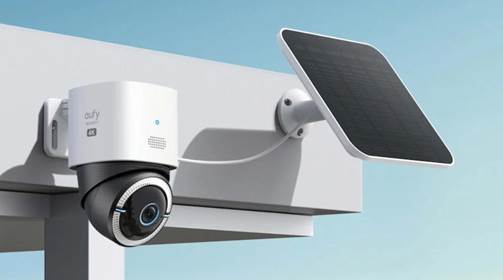How Often Should You Clean Your Security Cameras?
Maintaining the clarity and functionality of your security cameras requires regular cleaning. Dirt, dust, and weather effects can impede the device’s performance, potentially jeopardizing your security measures. Unclouded lenses ensure that you consistently capture quality footage. But how often should you engage in this cleaning routine? This article delves into the factors that dictate the cleaning frequency of your security cameras. We provide expert tips and outline common mistakes to avoid, ensuring your cameras perform at their best throughout the year.

Factors That
Affect Security Camera Cleaning Frequency
Several elements influence how
frequently you should clean your security cameras. Understanding these factors
helps maintain camera efficiency and extends their lifespan.
Indoor vs. Outdoor
Cameras
Indoor cameras generally require
less frequent cleaning compared to their outdoor counterparts. Indoors, cameras
are protected from environmental factors such as wind and rain, which are
prevalent outside. Typically, a monthly dusting should suffice to keep indoor
cameras working optimally. Outdoor cameras face a harsher environment with
exposure to rain, dust, and insects. Consequently, these cameras benefit from
bi-weekly cleaning. Regular checks ensure that their lenses remain free of
debris that can distort the footage.
Weather and
Environmental Conditions
Weather plays a crucial role in
determining cleaning frequency. In areas prone to heavy rainfall or snow,
security cameras can quickly gather water spots or ice, which obscure views.
Likewise, dry, dusty environments or places with significant pollen can cause
cameras to gather dirt more quickly. In such conditions, more regular
cleaning—perhaps weekly—may be required to maintain clear footage. Consider the
local climate and adapt your cleaning schedule accordingly.

Camera Placement and Usage
The placement of your camera
impacts how often it needs cleaning. Cameras positioned near sources of dirt,
like gardens or busy roadways, can accumulate grime faster. Meanwhile, heavily
used cameras or those capturing high-traffic areas might require frequent
cleaning to preserve their imaging quality. Cameras under shelters or awnings
might not need cleaning as often due to added protection from elements.
Evaluate each camera’s environment to determine a suitable cleaning schedule.
Signs Your
Security Camera Needs Cleaning
Certain indicators signal when your
security camera requires cleaning.
Blurry or Distorted Footage
The presence of unclear footage is
a primary indicator that your camera’s lens might be covered in grime or
smudges. If you notice that images appear hazy, take immediate action to
inspect the lens. Clean it thoroughly using a microfiber cloth or designated
lens cleaner. Such maintenance ensures the camera’s details and clarity remain
uncompromised, essential for surveillance tasks that require sharp imaging
inputs.
False Motion Alerts
Frequent false alerts can suggest your camera’s sensor
or lens needs cleaning. Dust or cobwebs can trigger unnecessary motion
detections. To verify this, gently clean the sensor area and lens. By doing so,
you minimize the risk of false alerts, ensuring that you receive notifications
only for legitimate movements within the monitored area.
Visible Dirt or
Obstructions on Lens
Manually inspecting the camera lens
for visible dirt or obstructions is the simplest method to determine if
cleaning is required. Any signs of debris or smudges are clear indications that
maintenance needs to take place. Regular visual inspections can prevent any
long-term impact on image quality. Keeping lenses spotless guarantees efficient
monitoring.
Tips to Keep
Your Security Cameras Cleaner Longer
Adopting preventive measures can
help keep your cameras cleaner for longer periods.
Use Weatherproof
Housing for Outdoor Units
Weatherproof housing offers
essential protection for outdoor security cameras. This housing shields the
device from rain, snow, and dust, significantly reducing the frequency of
required cleanings. By investing in quality enclosures, you extend the lifespan
of your camera and ensure it continues to capture crisp images regardless of
weather conditions.
Install Cameras in
Sheltered Areas
Whenever possible, install your
cameras in locations protected from weather elements. Positioning them under
roofs or coverings reduces exposure to rain and direct sunlight, which
complicates maintenance. Strategic placement helps prevent lens fogging and
accumulation of dirt, leading to fewer disruptions in recording clarity and
reducing cleaning frequency.
Enable Smart
Features Like AI Filtering
Modern security cameras are
equipped with smart technologies including AI filtering, eliminating background
noise and distractions. Enabling these features helps reduce false alerts
triggered by debris or weather effects. Consequently, your camera operates more
efficiently with fewer clean-ups, as AI assists in prioritizing relevant
footage over artifacts caused by unclean lenses.
Mistakes to
Avoid When Cleaning Your Security Camera
Cleaning security cameras requires
careful consideration to avoid causing damage. Never use harsh chemicals or
alcohol-based cleaners, as they can both degrade the lens quality and impair
its function. Instead, opt for mild, camera-specific cleaning solutions. Avoid
using rough cloths or tissues that could scratch the lens surface. Gently wipe
the lens with a microfiber cloth to maintain its smoothness and integrity.
Ensure all connectors and wiring are dry and intact before switching the camera
back on after cleaning.
Conclusion
Regular
cleaning of your security cameras is vital to maintaining clear, high-quality
footage. By considering the type, placement, and environmental conditions of
your cameras and looking for telltale signs when cleaning is necessary, you can
set an effective maintenance schedule. Preventive measures like weatherproof
housing, sheltered installation, and utilizing smart features assist in
minimizing cleaning needs. Avoid common cleaning mistakes to enhance your
camera’s effectiveness and longevity. Prioritize regular cleaning, and your
security system will consistently protect and provide, keeping your property
and peace of mind secure.


